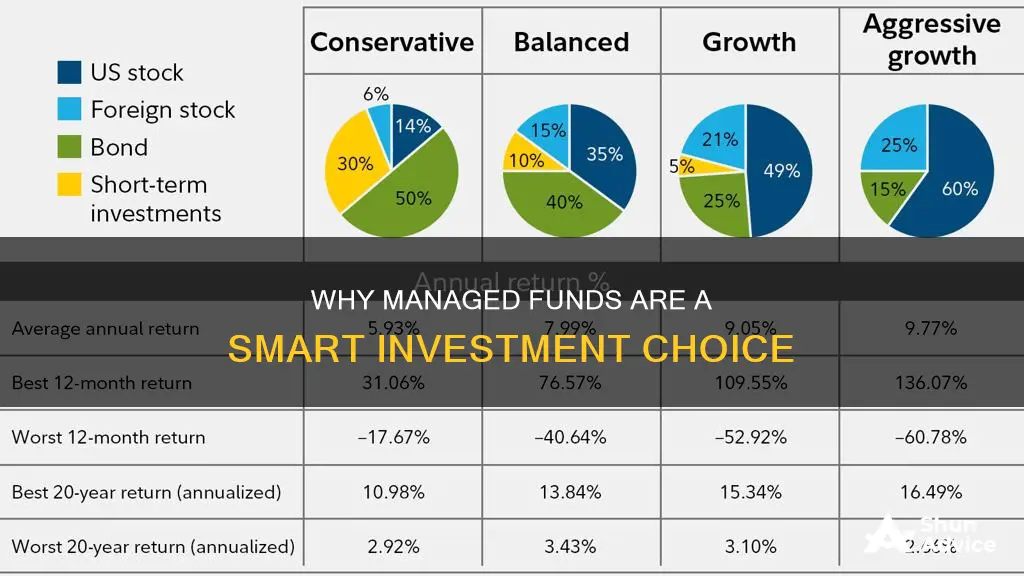
Investing in managed funds is an attractive option for many investors. Managed funds pool together the money of individual investors and use it to buy assets such as shares, bonds, property or cash. They are a popular choice as they offer a range of benefits, including access to a wide variety of investments, professional management, diversification, and convenience. Managed funds are also relatively easy to understand and buy, with low minimum investments. However, it is important to remember that all investments carry a degree of risk, and there may be high fees involved.
| Characteristics | Values |
|---|---|
| Access to a wide range of investments | International markets, different companies, industries, and countries |
| Diversification | Reduced impact of fluctuations in an investment's market value |
| Professional management | Experienced and qualified professionals who specialise in the selection and maintenance of investments |
| Capital appreciation | Difference between the buying and selling price of an asset |
| Compounding effect | Reinvesting any income earned back into the principal investment |
| Regular contributions | Dollar cost averaging |
| Fair pricing | Low minimum investments |
| Advanced portfolio management | Professional help in the management of an investment portfolio |
| Dividend reinvestment | |
| Risk reduction | Diversification across 50-200 different securities |
What You'll Learn

Access to a wide range of investments
Managed funds allow investors to access a wide range of investments that they may not have been able to access as individuals. This is because managed funds pool investors' money together to buy assets, and this collective buying power allows them to enter markets that require larger investments. For example, an individual investor would need $1 million to access the commercial money market, but they can access this market through a managed fund with a much smaller investment.
Managed funds can hold up to several hundred different investment types, which can be diversified across countries, asset classes (e.g. shares, property, bonds, cash), industries, and companies. This diversification can reduce the impact of fluctuations in an investment's market value.
Managed funds also provide access to markets and sectors in which investors have little or no experience. Fund managers are in constant touch with the markets in which they invest and use their expertise to make timely decisions on behalf of investors.
Retirement Funds: Risky Business for Long-Term Investors
You may want to see also

Reduced costs
The entry cost for investing in a managed fund is typically lower than buying shares directly. This is because your capital is pooled with other investors, giving you access to a variety of investments that would otherwise be inaccessible to an individual investor. For example, the commercial money market will not give access to an investor with less than $1 million, but through a managed fund, you can access this market with a much smaller investment.
Some managed funds require as little as $1,000 to invest, and you can often make additional contributions on a regular basis without being charged.
Actively managed funds, where the manager selects stocks based on their own convictions, tend to be more expensive than passively managed funds, which aim to match rather than beat the performance of a benchmark. Exchange-traded funds (ETFs) are usually passively managed.
While there are fees involved in investing in a managed fund, the amount varies greatly and can be relatively small compared to the cost of getting professional help to manage an investment portfolio yourself.
What Makes an Able Account an Investment Fund?
You may want to see also

Professional management
One of the main advantages of investing in managed funds is that they are professionally managed. Fund managers are experienced and qualified professionals who specialise in the selection and maintenance of investments. They have extensive contacts outside their firms and access to detailed information, which, combined with their in-house expertise, allows them to make informed, timely decisions on behalf of investors.
Fund managers are in constant touch with the markets in which they invest, providing an advantage for investors who want to put money into markets or sectors in which they have little or no experience. This is particularly beneficial when investing in international markets, which may be difficult for an individual to access on their own.
The experience of fund managers can help them consistently make investments that benefit their clients. They can use their knowledge to decide where to allocate money and assets, and they may also record the historical performance of an investment to help measure any changes in the value of a client's assets and funds.
The professional management of a fund manager can also help clients make important investment decisions, reducing stress and providing confidence that their account is secure and has the potential for growth.
Invest in ICICI Prudential: A Balanced Fund Guide
You may want to see also

Risk reduction
Managed funds can hold up to several hundred different investment types, which can be diversified across countries, asset classes (e.g. shares, property, bonds, cash), industries, and companies. This diversification can reduce the impact of fluctuations in an investment's market value.
The pooled capital in a managed fund is usually spread across different investments, which can help to mitigate the risk of certain assets performing poorly. This is a strategy known as diversification, and it is a key advantage of managed funds.
Additionally, fund managers are experienced professionals who can make informed, timely decisions on behalf of investors. They have extensive contacts and access to detailed information, allowing them to monitor the markets in which they invest. This is particularly beneficial for investors who want to invest in markets or sectors where they have little or no experience.
Overall, the risk reduction offered by managed funds can provide investors with a sense of security and confidence in the potential for growth, knowing that experienced professionals are managing their investments.
BPI Equity Fund: A Smart Investment Strategy
You may want to see also

Convenience
Accessibility
Managed funds allow investors to access assets or asset classes that may be difficult to access as an individual, such as international markets. By pooling money with other investors, managed funds provide access to a variety of investments that may have been otherwise inaccessible. This includes markets and strategies that rely on larger-scale buying power, such as the commercial money market, which typically requires a minimum investment of $1 million.
Experienced Fund Managers
Fund managers are experienced and qualified professionals who specialise in the selection and maintenance of investments. They have extensive contacts and access to detailed information, allowing them to make informed, timely decisions on behalf of investors. This is particularly beneficial for investors who want to invest in markets or sectors in which they have little or no experience.
Regular Contributions
Many managed funds offer the convenience of a regular savings plan, allowing investors to add to their investment on a regular basis. This strategy, known as 'dollar cost averaging', can result in purchasing additional units at a lower average price over time.
Reduced Risk
The pooled nature of managed funds means that capital is typically spread across different investments, helping to mitigate the risk of certain assets performing poorly. This diversification can reduce the impact of fluctuations in an investment's market value.
Time and Effort
Investing in managed funds can save time and effort for those who do not have the time, knowledge, or skills to make informed investment decisions. Fund managers are responsible for buying, selling, and trading investments, aiming to generate positive returns for their clients.
Mutual Funds vs. ETFs: Pros, Cons, and Your Investment Choice
You may want to see also
Frequently asked questions
A managed fund is a professionally managed investment portfolio. In a managed fund, the investments of individual investors are pooled together with other customers, and a team of professional investment managers then invest the pooled money, often across a range of asset classes.
Managed funds allow individuals to invest in assets or asset classes that may normally be difficult for an individual to access on their own, for example, international markets. They also have diversification benefits and the fund is managed by a professional fund manager.
Fund managers are experienced and qualified professionals who specialise in the selection and maintenance of investments. They maintain extensive contacts outside the firm and have access to detailed information, which allows them to make informed, timely decisions on behalf of investors.







